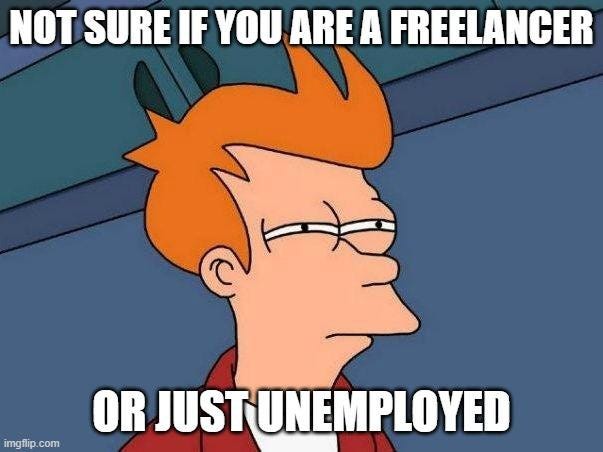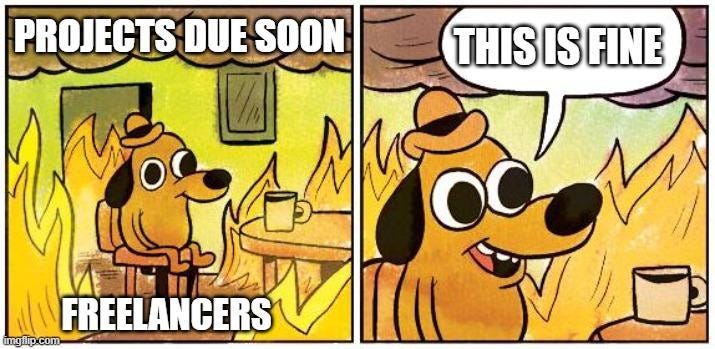

Working as UX designer in a company versus full-time freelancing: pros and cons...
source link: https://uxplanet.org/working-as-ux-designer-in-a-company-versus-full-time-freelancing-pros-and-cons-of-each-direction-556e7c09243d
Go to the source link to view the article. You can view the picture content, updated content and better typesetting reading experience. If the link is broken, please click the button below to view the snapshot at that time.
Working as UX designer in a company versus full-time freelancing: pros and cons of each direction
UX designers have many options to choose from when it comes to career decisions. Previously we’ve compared UX design at a startup vs. enterprise company. Today, we will discuss the pros and cons of full-time freelancing vs. working in a company.
Full-time freelance
Full-time freelancing. Image by Unsplash.
- Remote-friendly work. Most freelance jobs don’t require visiting an office, so you can work from anywhere.
- Interesting work challenges. Every project is different and has its challenges. Freelance is the best way to train yourself complete various types of tasks and learn a lot of information in a short period.
- Experience working with different types of clients. You will learn how to work with different kinds of clients, including clients from hell. You will learn to say ‘no’ to unreasonable demands of your clients (i.e., clients want something extra for free).
- Learn to sell yourself. You will learn how to sell your experience to potential clients and convince them to hire you.
- Opportunity to build your brand. UX professionals need to build a solid portfolio. Freelancing can help you build your portfolio of real projects fast.
- Not a 9–5 job. You likely will spend more time at work than you expect. It can be hard to maintain a work-life balance.
- Financially unstable. Freelancer rates often look higher than corporate salaries until you realize two things—you need to spend a lot of time searching for your clients and most of the time you won’t be able to bill by the hour for the time spent in meetings. As a result, when you start freelancing, it might be hard to calculate how much money you will earn at the end of the month. Of course, as soon as you have several regular clients, it will be much easier to improve your finances.

Image by legiit
- Unable to impact product design strategy. Compared to regular employees, freelancers have limited or no influence on core product design decisions such as product strategy. Their participation in a project is limited to a set of tasks they are hired to do.
- Have to deal with a lot of things. Full-time freelancing teaches you to do the work of a team.You cannot expect to do only UX design when you do full-time freelancing. You will also be part-time business development & sales manager (you must find new clients and sell your services to them) and a part-time accountant (you need to claim your money and pay taxes).
- Lack of team support. Freelance is typically working in a silo. When you work alone and communicate only with non-UX people, it might be harder to grow professionally simply because there is no one around who can help you improve your work.
- Unable to experience “big tech” design culture. If you don’t have experience working in big tech companies, you aren’t familiar with the process the companies follow when they build products. It doesn’t mean that this experience is a must-have, but it can definitely enrich your design process.
- Easy to reach burn-out state. In an attempt to earn more money, some freelancers take way more projects than they can handle. As a result, they constantly work under pressure and end up in a burn-out state.

Image by legiit
Corporate
Designers’ life in a company. Image by Unspash.
- Predictable workload. Time management becomes a relatively simple exercise when you work in a company. It’s much easier to estimate how much time you will need to complete your work. As a result, it’s much easier to plan your work day and achieve a healthy work-life balance.
- Financial stability. You always know how much money you will earn at the end of the month.
- You don’t have to mix different roles. You don’t have to be a sales manager or accountant. You can do only UX design at work.
- Career journey. If you join a corporation as a junior UX designer, you can expect to be promoted to a senior designer in a few years if you demonstrate solid performance.
- Being a part of a team. Design is a team sport, and when you join companies, you are likely to join a product design team. It’s great to feel a sense of being a part of a team and participating in the process of product co-creation.
- Easy to “sell” yourself on the market. Hiring managers value work experience in companies more than freelance. Work experience in big tech companies like Apple and Google can give you a competitive advantage over other candidates.
- It can be hard to get on board. Companies typically hire people with 3+ years of experience working in the field. “How to get a job if I have zero experience” is a typical question many first-year UX practitioners ask.
- Work can get monotonous. As soon as you learn your work responsibilities and do your job well, you might get bored at work simply because you don’t have new challenges.
- Lack of understanding of your strong & weak sides. Since you do a particular set of things at work, you don’t know how you perform different activities. For example, you might be good at prototyping but have limited experience in usability testing. You might assume that you might be good at usability testing, but it will be only your assumption.
So, which option is better?
I think it’s essential to have full-time freelance and corporate work experience. The full-time freelance will help you learn how to move fast when you solve design tasks and work with different types of clients. So if you’re making the first steps in UX design, you can freelance for at least a couple of years. It will help you build your portfolio and improve your presentation skills. After that, you can join a corporation.
Recommend
About Joyk
Aggregate valuable and interesting links.
Joyk means Joy of geeK